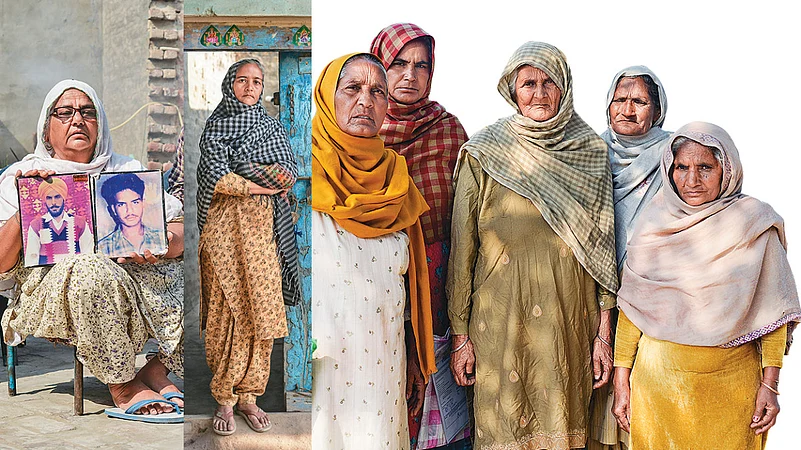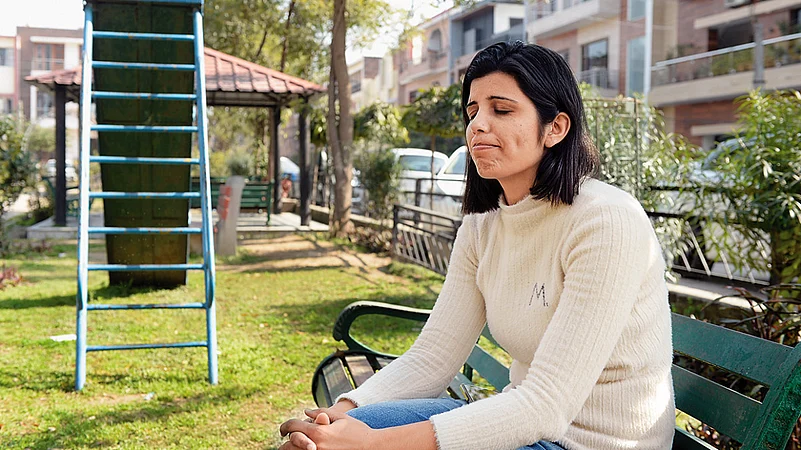Many representatives from almost all political parties—national as well as regional—have, of late, been vis-iting Veerpal Kaur’s humble home in Pun-jab’s Ralla village in Mansa district, req-uesting support in the assembly elections. A farm suicide widow, Veerpal, 43, had unsuccessfully contested the 2019 Lok Sabha elections as an independent candidate from Bathinda, which was retained by Shiromani Akali Dal (SAD) leader Harsimrat Kaur Badal.
Punjab Election 2022: For All Parties, It’s A Harvest Of Farm Suicides
The once economically prosperous state is now in the grip of unending farm distress. What ails the state and why has no government been able to do anything?

This election season, she decided to stay away owing to some serious health issues, and, as usual, financial problems—something that first drove her father, and after marriage, her husb-and and even her father-in-law to suicide. All these deaths happened within a span of 10 yea-rs due to Punjab’s biggest burning problem—agrarian distress.
“In a small state like Punjab, over 20,000 far--mers and agricultural labourers have taken their lives in the last 21 years because of eco-n-o-mic distress,” Ranjit Singh Ghuman, Econo-mics Professor of Eminence at Guru Nanak Dev University in Amritsar, tells Outlook.
In October 2021, farmers unions had rubbished the National Crime Records Bureau’s data that claimed farm suicides were falling in Punjab. NCRB’s data showed that 257 cases were recorded in 2020 as compared to 302 in 2019 and 323 in 2018. Then, in October last year, a study by the Ludh-i-ana--based Punjab Agri-c-u-ltural University rev--ealed that 7,303 labourers had died by suicide during 2000-2018, due to stress fuelled by low earnings and debt.
Addressing election rallies acr-oss the state, PM Narendra Modi rep-eatedly blamed the Con-g-r-ess for Punjab’s agrarian crisis, questioning why the party hadn’t implemented the recommendations of the Swaminathan Commission when in power.
In February 2019, leaders of SAD and BJP, along with around 300 debt-ridden families of farmers who had committed suicide over the past two decades, had marched to the state ass-embly to protest against the Captain Amarin-der Singh-led Congress government for not ful-filling its poll promise to waive all farm loans, as well as provide one government job and Rs 10 lakh as compensation to families of each suicide victim.
Following this, in April 2019, the then CM app--ealed to farmers not to commit suicide, ass-uring that his government was working on fulf-illing the poll promise. He even repeated his election slogan: “Karza-kurki khatam, fas-al di poori rakam (End to indebtedness and auc-tion. Full payment for crops)”. Unfortuna-tely, obse-rvers say most of the promises for families of farmers who committed suicide remained only on paper. Meanwhile, Captain Amarinder Singh jumped ship to become a BJP ally.
Prof Ghuman reacted to BJP’s unfulfilled pro-mises to the farming community, asking, “Why has the party ruling at the Centre gone silent on its promise of doubling farmers’ income by 2022?”

Families of farmers suicide victims blame all par-ties and governments for the plight of Pun-jab’s farmers and agricultural workers. Veerpal Kaur says, “Everyone is approaching me now, but none of these parties have done anything for the families of the suicide victims. Even AAP doesn’t look very promising on this issue. Neither are they talking about the drug menace that has affl-i-cted distre-s-sed farmers, nor do they seem conce-rned about the future of the widows of suicides.”
She adds that she wants every family of farmer suicide victims to cast at least one vote for San-yukt Samaj Morcha (SSM), the newly-launched party of a farmers’ union.
In Mansa, which is home to over 6,000 people, Veerpal says there are over 45 widows of indeb-t-ed farmers and agricultural labourers who committed suicide in the last 20 years. They used to cultivate rented farms and suffered heavy economic losses due to crop failures, she clarified.
Another farm widow in Mansa, Sukhwinder Kaur, lives with her daughter-in-law, Yashpal Kaur, whose husband, Harjinder Singh, disappe-ared in 2002 when the indebted family was stru-ggling with severe financial distress. Yashpal hasn’t heard of him since. At the time of his disa-ppearance, their only son, Sukhdeep Singh, who is mentally challenged, was just 40 days old. Suk-hwinder’s husband, Darshan Singh, died in 2004.
Although the aggrieved family owns a large tract of land, since the area is low-lying, food crops often get damaged after heavy rains. When Darshan threw himself under a speeding train, the family was already knee-deep in debt due to repeated crop failures.
“We’re yet to free ourselves from the debt that has been compounding over 25 years. We borrow from one relative to pay off another,” Suk-h-winder says, adding, “Whatever little help we got was from NGOs. Nothing from the government.”
A few years ago, the family lost their buffaloes to an unknown disease. Now the two women in the family of three have just one cow, whose milk they sell, besides making pickle and cow dung cakes for sustenance.
Kiranjit Kaur Jhunir, the convener of Commi-t-tee for Farmers and Families of Agrarian Suicide Victims, lost her father Gurnam Singh to farm dis-tress in 2016, after the cotton crop failed in Mansa. Her father, she says, hanged himself from a tree as he was finding it difficult to deal with the growing distress.
“A human being gets scared of even a needle prick. One can imagine the kind of trauma a farmer undergoes before he decides to end his life,” she says, adding that male farmers committing suicide are also victims of patriarchy. “In Punjabi society, men feel they are the sole providers for their families. They see crop failu-res as their personal failures, and find it beneath their dignity to share the trauma with women in the families. This mindset also needs to change.”

When her father committed suicide, she says, “I was too young to understand the issue of farm distress. After a few years, I gradually started to realise that there are thousands of families in Punjab who share my grief. Then I started politically educating farm widows, besides putting in place a strong solidarity network.”
ALSO READ: Punjab’s Dalits: Seen But Not Heard
With her efforts, many farm widows have bec-ome articulate. “In the past few years, we have held several conferences wherein we invited all big politicians of Punjab and made them listen to the widows and their woes,” she says, adding that the 2020-21 farmers’ agitation has rev-ived her hopes that farmers can get their dema-nds met.
Discussing the political discourse in the recen-t elections, agriculture economist Devinder Sharma tells Outlook, “Issues of farmers were largely missing from med-ia and political speeches. But interestingly, manifestos of all parties took these up, touching upon every factor contributing to farm distress.”
But he points out a dichotomy in the BJP’s manifesto, as well as this year’s Union budget, “The party says one thing at the Centre and ano-t-her thing in Punjab. Here they gave the poll slogan, “Mehnat ka poora daam (Full payment for labour).” Citing the example of Mini-mum Sup-p-ort Price (MSP), he continued, “At the state, they are also promising MSP on pulses, vegetables and oilseeds. This is what farmers had been demanding, as wheat and rice already have MSP. They are talking about crop diversification, organic and sustainable farming, besides promising to write-off bank loans of all farmers who have less than five acres of land. What else could the farmers ask for? But the central budget is silent on it.”
“All these issues are linked to farm suicides,” he says. “Since farmers are not getting the right kind of price for their crops, the agrarian distress is bound to grow.” Referring to the BJP’s Uttara-kh-and manifesto, he says it promises that the Pradhan Mantri Kisan Samman Nidhi scheme will be dou-b-led to Rs 12,000 per annum for farmers, besides promising financial assistance for agricultural lab-ourers.
“This is what we had been demanding in the central budget, besides asking for Rs 6,000 per annum to landless farm labourers,” he says. “They say one thing in one state and another thing in another state.”
As he draws comparison between the Union budget and the ruling party’s poll promises, he says, “The Union budget is meant for corp-o-rates, while election manifestos are brought in just to entertain the masses.”
“Election Commission of India should legalise poll manifestos and fix responsibilities to political parties,” he demands. “That way, the manifestos would become the people’s budget.”
Professor Ghuman, meanwhile, suggests a slew of measures, saying the new government in Pun-jab must implement them to assuage the agrarian distress. “There is a strong need for crop diversification to save groundwater, so that agriculture doesn’t become unviable in the near future. The government must focus on surplus workforce in the farming sector—whi-ch inclu-des both farmers and landless labo-urers—and ensure that they become emp--l-oy-able and find employment. Jobs should be created for them in rural non-farm sectors,” he says, emphasising crop processing units and cooperative use of farm machinery. He adds that the rural employment scheme MNREGA has proven to be ineffective in checking farm distress in Punjab.
Claiming that agriculture is not going to remain sustainable in Punjab—which emerged as a mod-el state in the 1980s after the Green Revolu-tion—under the business-as-usual mode, Professor Ghu-man tells Outlook, “Today, 80 per cent of far-mers in Punjab don’t want their sons to continue with farming. They are selling their farms and sending their children abroad to make sure they have a secure future.”
“If farm? discontent is not redressed, I’m afraid Punjab will witness a situation worse than what it saw during the insurgency,”
he rem-arks.
Veerpal—who is an aanganwadi worker—also doesn’t want her children to take up farming. Her daughter is pursuing law, while her son is in coll-ege and works part time as an accountant to sup-port the family. The family doesn’t even have a proper house of their own. “No one see-ms genuinely concerned about farming, farmers or their problems,” she says. “Alth-ough NGOs like Saha-y-ata Club have ensu-red education of the children of farm wid-ows, the new Punjab government must provide them employment.”
(This appeared in the print edition as "Harvest Of Farm Suicides")
- Previous Story
 Elections 2024: Ashok Tanwar Joins Congress Again; Sehwag Endorses Congress Candidate In Haryana
Elections 2024: Ashok Tanwar Joins Congress Again; Sehwag Endorses Congress Candidate In Haryana - Next Story
























